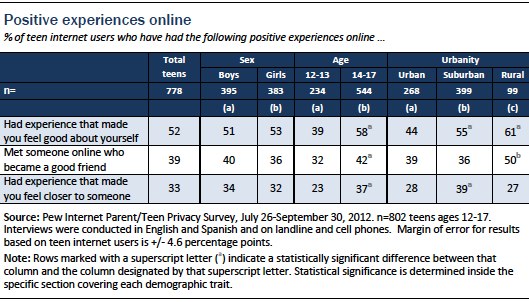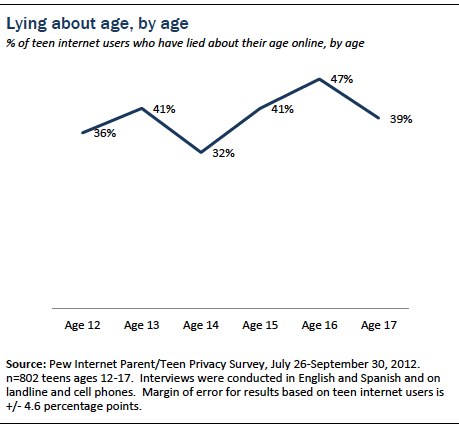In the current survey, we wanted to understand the broader context of teens’ online lives beyond Facebook and Twitter and the context in which teens wrestled with all the privacy options before them. And while many teens report positive experiences online, such as making friends and feeling closer to another person, some encounter unwanted content and contact from others.
Half of online teens say they have had an experience online that made them feel good about themselves.
Looking at some of the experiences teens have online, many report positive outcomes.49 In a broad question about all online activity that was asked of all teen internet users, 52% of online teens said they had an experience online that made them feel good about themselves. Among teen social media users, 57% said they had an experience online that made them feel good, compared with just 30% of teen internet users who do not use social media. In keeping with the age-related findings we reported in 2011, older teens are much more likely to report a positive experience of this kind; 58% of those ages 14-17 said this compared with 39% of those ages 12-13. Girls and boys are equally as likely to report feel-good experiences, and quite strikingly, these positive experiences are universally felt across all socioeconomic groups. However, youth living in urban areas (44%) are less likely than those living in suburban (55%) and rural (61%) areas to say that they have had an experience online that made them feel good about themselves.
One in three online teens say they have had an experience online that made them feel closer to another person.
Many online teens also say they have had online experiences that made them feel closer to someone else; in our current survey, 33% of all online teens reported a deepened connection to someone because of something that happened online. Looking at teen social media users, 37% report having an experience somewhere online that made them feel closer to another person, compared with just 16% of online teens who do not use social media. In a similar question asked in 2011, 58% of social media-using teens said they had an experience on a social network site that made them feel closer to someone else.
Again, a teen’s age is closely associated with this kind of positive outcome from online experience. While 37% of online teens ages 14-17 reported having an experience online that made them feel closer to another person, just 23% of online teens ages 12-13 said they had this experience. Girls and boys are equally as likely to report online experiences that made them feel closer to someone else, and once again, there were no notable differences across socioeconomic groups.
Online teens living in urban areas are less likely than those living in suburban areas to say they had an online experience that made them feel closer to another person (28% vs. 39%).
39% of online teens say they have met someone online who became a good friend.
Four in ten online teens say they have met someone online who later became a good friend. African-American teens are more likely than white teens to report meeting good friends online; 54% of African-American teen internet users say they have met a good friend online compared with 35% of white teens. Boys and girls are equally likely to report meeting good friends online, but older online teens ages 14-17 are more likely than younger teens to say they have met a close friend online (42% vs. 32%). Teens living in the lowest-income households (earning less than $30,000 per year) are more likely than those living in the higher-income households (earning $50,000 or more per year) to say that they have met a good friend online (53% vs. 30%). Internet-using teens living in rural areas are more likely than those living in suburban areas to say that they have met a good friend online (50% vs. 36%).

4% of teens have posted something online that caused problems for them or a family member, or got them in trouble at school.
Teens’ experiences online are not always positive. A small percentage of teens have engaged in online activities that had negative repercussions for them or their family.
Teens post an enormous amount of content online—on social media sites, in forums, on blogs, and in comments. In a small percentage of cases, the posting of that content has unfortunate consequences.50 Four percent of teen internet users between the ages of 12 and 17 say they have shared sensitive information online that later caused a problem for themselves or other members of their family. A similar number of teens (4%) have posted information online that got them in trouble at school.
Older teens ages 14-17 are more likely than younger teens (6% vs. 2%) to say that they’ve shared sensitive information that later had consequences for them or a family member. Older girls are the most likely to report this, with 7% of older girls saying they’ve posted material that caused problems for them or their family, compared with 1% of younger girls. African-American youth (10%) are more likely to report that they have posted something that got them in trouble at school than white youth, of whom 3% say they’ve gotten in trouble at school because of an online posting. Teens with parents who use social network sites are also more likely to say that they’ve gotten in trouble at school because of something posted online. Note that we do not know whether the parent was using social media or was friends with the child at the time of the incident the teen describes.

Large numbers of youth have lied about their age in order to gain access to websites and online accounts.
In 2011, we reported that close to half of online teens (44%) admitted to lying about their age at one time or another so they could access a website or sign up for an online account. In the latest survey, 39% of online teens admitted to falsifying their age in order gain access to a website or account, a finding that is not significantly different from the previous survey.51
Age falsification was reported among teens of every age, with no statistically significant variation across age groups.52 However, there is special interest in the activities of the youngest teen internet users, who are subject to special protections afforded by the Children’s Online Privacy Protection Act (COPPA). Under COPPA, companies that have knowledge of users under age 13 on their site are required to get verifiable parental consent for the collection of any personal information from that child. For this reason, many general audience websites that collect personal information from their users (such as Facebook and YouTube) require that users be at least 13 years old. In the current survey, 36% of online teens who are 12 years old admitted to falsifying their age in order to gain access to a website or account.
Across all socioeconomic groups and geographic locations, teens are equally as likely to report lying about their age to gain access to websites and online accounts.

Close to one in three online teens say they have received online advertising that was clearly inappropriate for their age.
Exposure to inappropriate advertising online is one of the many risks that parents, youth advocates, and policy makers are concerned about, but little is known about how often teens encounter online ads that they feel are intended for more (or less) mature audiences.53 In the latest survey, 30% of online teens said they had received online advertising that was “clearly inappropriate” for their age. However, what constitutes inappropriate content was defined by the teen respondent. Teen respondents could have encountered something as innocuous as an advertisement intended for retirees or it could have been something that they deemed was too violent or sexually explicit. Teens are equally as likely to say they encounter inappropriate advertising, regardless of their age, sex, socioeconomic status, or geographic location.
Previously released findings from this survey show that parents are broadly concerned about advertisers’ access to their children’s information online; 81% of parents of online teens say they are concerned about how much information advertisers can learn about their child’s online behavior, with some 46% being “very” concerned.54
One in six online teens say they have been contacted online by someone they did not know in a way that made them feel scared or uncomfortable.
Another major concern around the safety of teens online relates to the extent to which they receive unwanted contact from people they do not know. In the current survey, 72% of parents of online teens said they were concerned about how their child interacts online with people they do not know, with some 53% of parents being “very” concerned. Unwanted contact from strangers is relatively uncommon, but 17% of online teens report some kind of contact that made them feel scared or uncomfortable.55
Gender is strongly associated with unwanted contact online; online girls are more than twice as likely as boys to report contact from someone they did not know that made them feel scared or uncomfortable (24% vs. 10%). Teens from all socioeconomic backgrounds and geographic areas are equally as likely to report contact from an unknown person that made them feel scared or uncomfortable.
Among social media users, teens who have experienced some kind of unwanted contact online that made them feel scared or uncomfortable are among the most likely to say that they limit what certain friends can see on their profile. These teens are more likely than those who have not had experienced unwanted contact to say that they limit what certain friends can see on their profile (35% vs. 14%).




